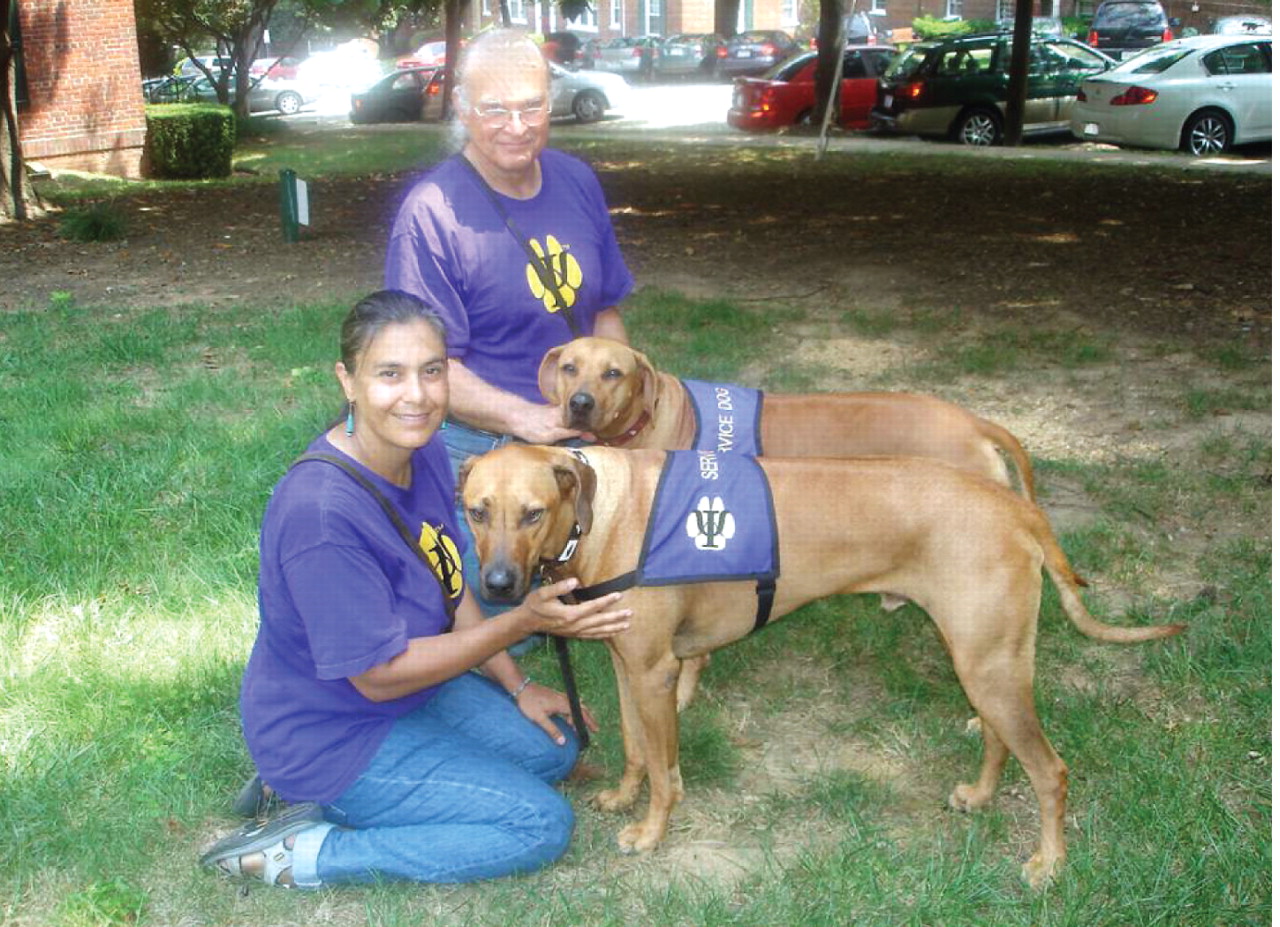Next time you hear a dog bark, you may be surprised to realize that it is a very special form of communication—one uttered by a psychiatric service dog, or simply a “psych dog.”
People who use these canines “have mood and anxiety disorders, posttraumatic stress disorder, or other types of psychiatric illnesses,” Joan Esnayra, Ph.D., founder and head of the Psychiatric Service Dog Society (PSDS) in Arlington, Va., said during a recent interview.
Although there are no hard numbers, as many as 10,000 Americans and Canadians may be using one, she estimated, based on the number of contacts she and fellow PSDS volunteers have had with psych-dog users and on how interest in psych dogs has grown since 2002, when she founded the PSDS.
But one thing is certain: Some 900 people throughout the United States and Canada now regularly participate in the PSDS alone, and Esnayra and fellow PSDS volunteers field several thousand calls or e-mails a year.
“We get almost more calls than we can handle,” she said. “And I get people calling all the time now, saying, ‘My psychiatrist tells me I need to get a dog.’ It happens really frequently, much more than it used to. I would say about 50 percent of the calls we get are this type of call.”
What Psych Dogs Do
So what can they do for their owners? One thing is to perform specific, straightforward physical tasks for which they have been trained, just as other types of service dogs do for their owners, Esnayra explained.
For example, a dog can remind a patient to take medication at certain times of the day. It can interrupt repetitive behavior in someone with obsessive-compulsive disorder—for example, someone who checks locks repetitively each night. If a veteran with posttraumatic stress disorder (PTSD) is having night terrors, a dog can wake him or her up and may even turn on a light.
But psych dogs can also be trained to perform other forms of assistance for their owners that are more intuitive and subtle than those described above, Esnayra reported. “We call this assistance ‘work.’ In my opinion, work is the most helpful form of assistance that dogs can provide people with mental illnesses.”
For instance, a dog can be trained to alert an owner who is prone to panic attacks that an attack is about to occur; this “heads up” gives the owner time to decide how he or she is going to manage the attack. “Behavioral choices include engaging a cognitive-behavioral response to the dog's alert or employing mindful self-regulatory approaches that may include deep breathing exercises with one's dog,” said Esnayra. A dog can also be trained to get an owner out of bed if that person is too depressed to do so. “This form of ‘work’ leverages the inherent structure that is imposed upon one's life when one owns a dog,” she said.
And in other cases, “‘work’ leverages the dog's natural response to its immediate environment in a way that increases handler insight and mastery over a given situation,” Esnayra noted.
Say a person with schizophrenia starts hearing a cacophony of voices telling him that he is a bad person; he could look at his psych dog to see what it is doing. If it is sleeping quietly next to him, he can conclude that the voices talking to him are a hallucination, not the real thing.
Or take a veteran with PTSD who develops severe anxiety when out in public, terrified that something bad is going to happen. That vet can evaluate his dog's body language to determine whether he is being hypervigilant or there really is a danger. If the dog's hackles are up, if it gives a low decibel growl, or if it engages in a predatory, stalking posture, then there is probably a danger in the environment. But if the dog's body is relaxed and its tail wags from side to side, that signals to the owner that there is no immediate danger.
They Can Make Life-Changing Difference
When psych dogs fulfill such responsibilities, they can make a difference in their owners' lives, anecdotal reports indicate.
For example, “People with schizophrenia who are using dogs for hallucination discernment tell me that that is the most important thing that the dog does for them, that it is life changing,” Esnayra emphasized.
Cheryl Diamond, M.D., a psychiatrist in Ashland, Ore., has an adult patient with severe schizophrenia who is heavily medicated and who has difficulty getting up in the morning in spite of the alarm clock ringing. The patient's dog is trained, when the alarm goes off, to jump up on the bed and nose the patient until he puts his feet on the floor and stands up. The dog is also trained to nudge him to go to the place near the kitchen sink where he keeps his medications. The dog has likewise been taught to detect when the patient is fussy and dissociative and to prod him back to reality. Such assistance is extremely helpful for this patient, Diamond told Psychiatric News.
Diamond also has a patient with PTSD who uses a psych dog. The dog helps protect the patient from hyperarousal and becoming startled when out in public. For instance, if a stranger gets too close to the patient, the dog inserts itself between the patient and the stranger. “The dog acts as a buffer between her and others so that she can do her shopping or engage in other activities in a way that she couldn't before,” Diamond said.
Caroline Fisher, M.D., a psychiatrist affiliated with the University of Massachusetts, has two young patients with Asperger's syndrome who use psych dogs. “I was initially pretty skeptical about the whole thing, but the dogs do seem to help,” said Fisher. “For example, youngsters with autism spectrum disorders have trouble moderating their internal experiences. If they get excited, they get too excited. If they get mad, they get too mad. The dogs notice when they are getting wound up and help them settle down.”
What is really needed to demonstrate that psych dogs are valuable to people with psychiatric illnesses, of course, are scientific studies. And what appears to be the first scientific study on the subject will soon get under way. Esnayra, a scientist by training, has received funding from the Department of Defense (DoD) to conduct a pilot study at Walter Reed Army Medical Center to see whether psych dogs can benefit veterans with PTSD.
“What the DoD especially liked about our study proposal is that we plan to measure psychoneuroimmunological markers for stress in our subjects and see whether psych dogs alter expression of those markers,” Esnayra said.
If Esnayra could have only one wish regarding psych dogs fulfilled within the next decade, it would be to have the evidence base for their usefulness firmly established, she said.
But whether or not that happens, she is optimistic about psych dogs' future. “We at the PSDS have a phrase, ‘Guide Dogs for the Mind.’ It is a concept that a dog can help you with your mental processes. I think that phrase is going to be understood by far more people 10 years from now than it is today.”


